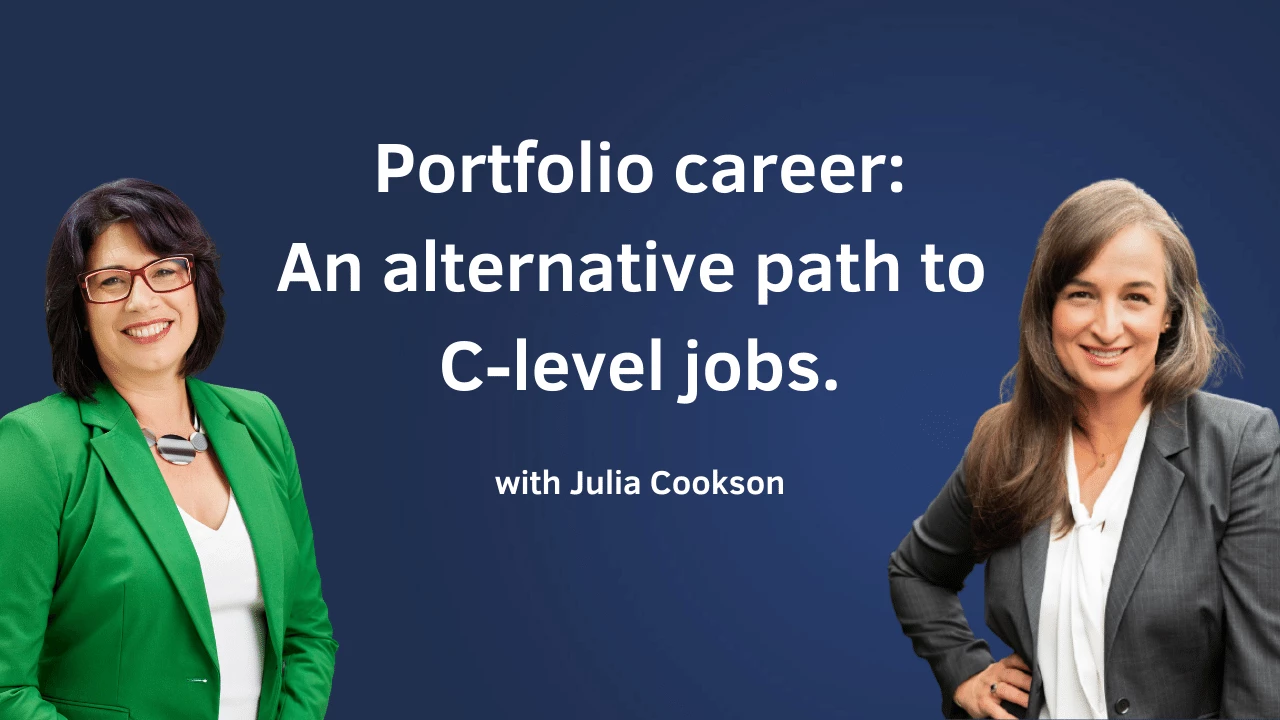Episode 111 - Portfolio Career: An Alternative Path to C-Level Jobs, with Julia Cookson

Julia Cookson has extensive experience in health and community support services, having worked in the broader sector for over 18 years. She began her executive career in a national genomics facility at an exciting point in time when next-gen technology reshaped medical discovery. It was this experience that sparked her passion for health services. Since she has held Executive roles in NFPs across aged and disability care, mental health, and family violence, leading their transformation through the raft of reforms. She has represented aged care businesses at the Royal Commission and been intimately involved in the Aged Care Workforce Strategy Taskforce and senate inquiries into Family Violence.
Julia has always been ambitious for her career and deliberately looked for ways to expand her HR expertise to become CEO-ready. This is how she landed in the land of interim executive roles.
Through a mix of interim executive assignments and permanent roles, consultancy, board, and advisory positions, she has expanded her expertise to include Governance, Strategy, Finance, Risk, Brand, and Digital to diversify her knowledge base. With her contacts and with the help of brokers such as Donna Burr, she deliberately moves between interim executive work and permanent executive roles. She combines this with other revenue streams in her portfolio, including non-executive directorships and Advisory work.
While interim assignments have broadened Julia’s network and exposed her to new ways of thinking and different sectors, permanent roles allow her to consolidate her know-how in a specific sector.
Listen to this episode to learn what made Julia start her portfolio career, how she gets interim management jobs and other income-generating opportunities, and her advice for executives willing to give it a go.
About our Guest, Julia Cookson
Julia has extensive experience in health and community support services, having worked in the broader sector for 18+ years. She began her executive career in a national genomics facility at an exciting point in time when next-gen technology reshaped medical discovery. It was this experience that sparked her passion for health services. Since she has held Executive roles in NFPs across aged and disability care, mental health, and family violence, leading their transformation through the raft of reforms, she has represented aged care businesses at the Royal Commission and been intimately involved in the Aged Care Workforce Strategy Taskforce and senate inquiries into Family Violence. Julia became a Director on Lorne Community Health’s Board during a period of rapid growth in that business and is now Chair of Finance and Audit for Connect Health. Her early career as an HR specialist focused on guiding the people side of large-scale programs repositioning businesses. She always had her eye on becoming a CEO and so has deliberately sought ways to expand her expertise to become CEO-ready: Governance, Strategy, Finance, Risk, brand, and digital to diversify her knowledge base to shape the customer experience, business improvement, and growth strategies. She deliberately moves between interim executive work and permanent executive roles and combines this with other revenue streams in her portfolio; Directorships and Advisory work. Interim assignments broaden her networks and exposure to new ways of thinking in different sectors, and permanent roles allow her to consolidate her know-how into a sector. She deliberately looks for organizations with complex problems to solve in disruptive markets and lots of ambiguity. The different streams of her portfolio give her exposure to businesses at various stages in their growth cycle and business maturity, from scaling up to ensuring sustainability and a pathway to recovery where funding is reduced. This is truly a 360-degree perspective.
She is passionate about strengthening the organizations she works with, ensuring the voice of the customer is heard at the Board level. Her inclusive style shapes the decision-making process, improves innovation, and enables the creation of a healthy and purposeful culture.
Resources mentioned in this episode
Timestamps to guide your listening
Transcript of this episode
About the Host
Hello, I’m Renata Bernarde, the Host of The Job Hunting Podcast. I’m also an executive coach, job hunting expert, and career strategist. I teach professionals (corporate, non-profit, and public) the steps and frameworks to help them find great jobs, change, and advance their careers with confidence and less stress.
If you are an ambitious professional who is keen to develop a robust career plan, if you are looking to find your next job or promotion, or if you want to keep a finger on the pulse of the job market so that when you are ready, and an opportunity arises, you can hit the ground running, then this podcast is for you.
In addition to The Job Hunting Podcast, , on my website, I have developed a range of courses and services for professionals in career or job transition. And, of course, I also coach private clients.
Contact Renata Bernarde
I’m determined to help you! I want you to feel empowered, nail your next job, and have the career you want.
My free resources for job hunters: The Optimized Job Search: Weekly Schedule & Masterclass.
Learn more about my services, courses, and group coaching: RenataBernarde.com
